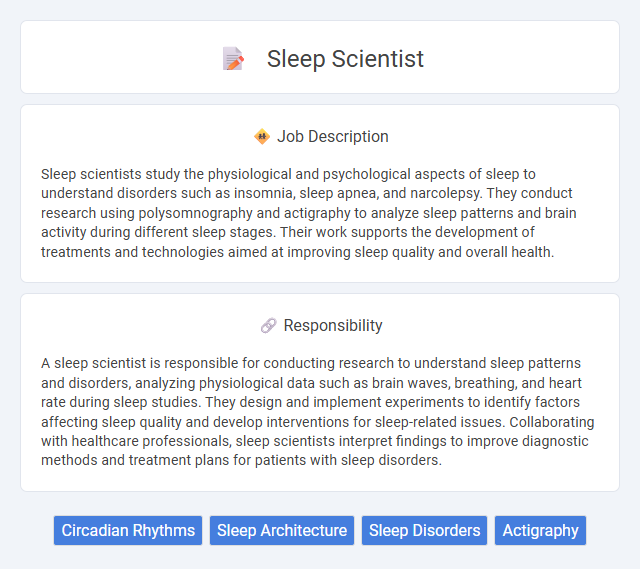
Sleep scientists study the physiological and psychological aspects of sleep to understand disorders such as insomnia, sleep apnea, and narcolepsy. They conduct research using polysomnography and actigraphy to analyze sleep patterns and brain activity during different sleep stages. Their work supports the development of treatments and technologies aimed at improving sleep quality and overall health.
Sleep scientists probably suit individuals with strong analytical skills and a keen interest in human physiology and sleep disorders. People comfortable working in laboratory settings and handling complex data are likely to thrive in this role. Candidates who prefer hands-on research and patient interaction rather than repetitive tasks may find this job more suitable.
Qualification
Sleep scientists require a strong foundation in biology, neuroscience, or psychology, often holding advanced degrees such as a master's or Ph.D. Expertise in polysomnography, data analysis, and research methodologies is essential for analyzing sleep patterns and disorders. Certification from recognized bodies like the Board of Registered Polysomnographic Technologists (BRPT) enhances credibility and career prospects.
Responsibility
A sleep scientist is responsible for conducting research to understand sleep patterns and disorders, analyzing physiological data such as brain waves, breathing, and heart rate during sleep studies. They design and implement experiments to identify factors affecting sleep quality and develop interventions for sleep-related issues. Collaborating with healthcare professionals, sleep scientists interpret findings to improve diagnostic methods and treatment plans for patients with sleep disorders.
Benefit
Sleep scientists likely enjoy benefits such as improved understanding of human health patterns and the potential to contribute to innovative treatments for sleep disorders. Their work may offer opportunities for collaboration with medical professionals and access to cutting-edge research tools. The role probably provides a satisfying sense of impact by enhancing overall wellness and quality of life for individuals.
Challenge
A sleep scientist is likely to encounter challenges related to accurately interpreting complex sleep data and understanding the underlying mechanisms of various sleep disorders. They probably face difficulties in developing effective treatment plans that can be personalized to diverse patient needs. There is a chance that staying updated with constantly evolving research and technologies adds to the complexity of the role.
Career Advancement
Sleep scientists advance their careers by specializing in neurophysiology, chronobiology, and sleep disorder diagnostics, often pursuing doctoral degrees or postdoctoral research. Gaining certifications such as Registered Polysomnographic Technologist (RPSGT) enhances job prospects in clinical and research settings. Leadership roles in sleep clinics, academic institutions, or pharmaceutical companies provide opportunities for professional growth and influence in sleep health innovations.
Key Terms
Circadian Rhythms
Sleep scientists specializing in circadian rhythms analyze the biological processes that regulate the sleep-wake cycle, aiming to understand how internal clocks influence human health. They conduct research on the impact of light exposure, shift work, and genetic factors on circadian alignment to develop treatments for sleep disorders and optimize performance. Their work supports advancements in chronotherapy, enhancing personalized medicine by synchronizing treatment timing with patients' circadian phases.
Sleep Architecture
Sleep scientists specializing in sleep architecture analyze the cyclic patterns of REM and non-REM sleep stages to understand brain activity and physiological processes during rest. They utilize polysomnography data to identify disruptions in sleep cycles associated with disorders like insomnia, sleep apnea, and narcolepsy. Their research informs treatment strategies aimed at improving sleep quality and overall health outcomes by optimizing restorative sleep phases.
Sleep Disorders
Sleep scientists specializing in sleep disorders analyze patterns and abnormalities in sleep to diagnose conditions such as insomnia, sleep apnea, narcolepsy, and restless leg syndrome. They utilize polysomnography, actigraphy, and neuroimaging tools to gather data on brain activity, breathing, and muscle movements during sleep cycles. Their research contributes to developing targeted therapies and improving patient outcomes in sleep medicine centers and research institutions.
Actigraphy
Sleep scientists specializing in actigraphy use wearable devices to monitor and analyze sleep-wake patterns through movement data, providing objective insights into circadian rhythms and sleep quality. This non-invasive method enables continuous tracking over extended periods, crucial for diagnosing disorders such as insomnia, sleep apnea, and restless legs syndrome. Leveraging actigraphy data, sleep scientists improve personalized treatment plans and contribute to research on sleep behavior and its impact on overall health.
 kuljobs.com
kuljobs.com